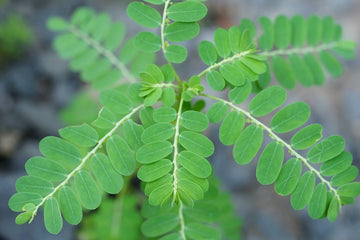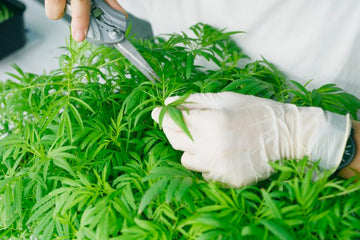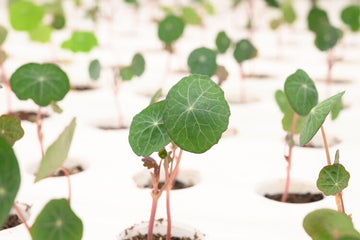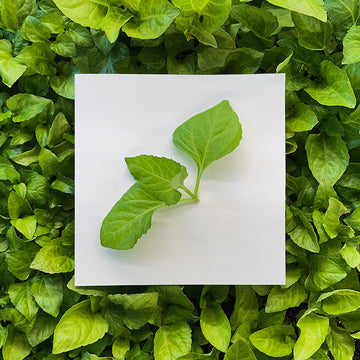
1. Chamber Bitter
(Phyllanthus urinaria) 葉下珠, 珍珠草
Chamber bitter (also commonly known as stonebreaker, gripe weed or little mimosa) is native to Hong Kong and other parts of Asia and has spread invasively as a weed throughout other tropical areas of the world. The urinaria in its scientific name, as well as the common name stonebreaker, refers to its traditional use in herbal medicine as a treatment for urinary disease and kidney stones.
You can find this hardy little plant growing all over the city. You might even find it sprouting out of the cracks on the sidewalk outside your house. It’s not recommended to eat the ones in range of too much foot traffic or pets, but there are plenty to be found along country trails. Keep your eyes peeled and you’ll see how much of the plant life we encounter on a daily basis can be utilized for culinary or medicinal purposes.

Chamber bitter often can be found growing out of cracks in sidewalks, especially close to wooded areas.
The leaves, bark, and roots of Chamber Bitter taste bittersweet and have long been used to treat a variety of conditions, including:
Hepatitis B
Diabetes
Flu
Fever
Jaundice
Vaginitis
Conjunctivitis
Tumors
Headache
Bloating
Dysentery
2. Chinese Fever Vine
(Paederia foetida) 雞矢藤

Chinese Fever Vine is found all throughout Hong Kong, and its long vines can be seen twining themselves around street-side fences just as often as through the dense undergrowth of country parks. Its small berries are a prized food source for birds, who then aid in seed dispersal across the territory.
The vine's small, delicate white and lilac flowers conceal a hidden property that gives rise to its other common name, Stink Vine. If you crush the leaves they'll emit a strong sulphuric odor, which might discourage you from eating the raw leaves. However, after cooking the smell is quite diminished and is used for both culinary and medicinal purposes throughout Asia. The leaves can be boiled in soups or steamed and minced alongside garlic as a side dish. External application of mashed leaves can help reduce swelling, bruising, and joint stiffness.


Traditionally used to treat:
Rheumatism
Arthritis
Asthma
Diarrhea
Indigestion
For more information on the plants above, as well as suggested culinary and medicinal uses, please refer to the links below!
Disclaimer: The information contained in this article is for reference only. Consult your medical professional before using any of the plants mentioned to treat a medical condition.
Sources:
https://www.cabi.org/isc/datasheet/46061
https://www.healthbenefitstimes.com/chamber-bitter/
https://rottenbotany.com/tag/chinese-fever-vine/
http://varsity.com.cuhk.edu.hk/index.php/2017/12/foraging-pick-food-medicines/
https://journals.sagepub.com/doi/pdf/10.1177/1934578X1400900640
https://www.healthbenefitstimes.com/skunkvine-paederia-foetida/




